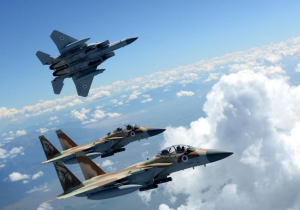
Liberman’s comment was the first time a senior Israeli official responded to foreign reports; comes after Syria accused Israel of striking targets near Damascus.
By ANNA AHRONHEIM, JPOST.COM STAFF
Israel has a policy of striking targets in Syria to prevent the smuggling of sophisticated weapons, including WMDs, to Hezbollah, Defense Minister Avigdor Liberman said in a rare admission on Wednesday.
Israel, which usually neither confirms nor denies responsibility for alleged strikes, is “working primarily to protect the security of our citizens, defend our sovereignty, and prevent the smuggling of sophisticated weapons, military equipment and weapons of mass destruction from Syria to Hezbollah,” Liberman said.
And while Israel has “no intention to intervene in the civil war in Syria,” Liberman, who was meeting with EU diplomats in Jerusalem, stressed that “no matter what the regime in Syria will be in the future, Iran and Assad cannot be part of the arrangement.”
Liberman told the diplomats that “in today’s world it is impossible to rely on the international community and that every country should rely only on itself.”
Earlier on Wednesday, the Syrian regime accused Israel of firing surface-to-surface missiles targeting the Mezzeh Air Base near Damascus, causing damage but no casualties.
 Map of location of alleged strike – Arab media[/caption
Map of location of alleged strike – Arab media[/caption
Wednesday a number of surface-to-surface missiles from inside the occupied territories to the west of Tall Abu al-Nada [Mount Avital on the Golan Heights] that landed in the surroundings of al-Mezzeh Airport west of Damascus.”
The strike would “only make the Syrian Arab Army even more determined to cut off the hands of the terrorist agents of the Zionist entity, which should be held fully responsible for the repercussions and consequences of these criminal attacks,” the military source continued.
The air base houses the headquarters of the Assad regime’s notorious air force intelligence service and its prison. The attack allegations mark the second instance of suspected Israeli strikes against targets in Syria in two weeks.
While Syrian state media said the attack came from “inside the occupied territories to the west of Tall Abu al-Nada,” or Mount Avital, Hezbollah’s Al-Maydeen television channel said the group “was almost certain” that the Israel Air Force carried out the strikes from Lebanese airspace, similar to the last alleged Israeli air strike against Hezbollah weapons convoys near Damascus and an arsenal belonging to the Syrian Army’s Fourth Battalion.
Hezbollah had earlier accused the IAF of striking Mezzeh, close to President Bashar Assad’s palace, at around 4 a.m. Unnamed Syrian sources quoted by Lebanon’s Al-Nashrah news site had said that the missiles targeted the air base’s runway and operations command center, while another unnamed source said that they targeted the regime’s Fourth Division operations center at the base.
The border with Syria has been tense since the civil war erupted in 2011, and while Israel has never publicly admitted to carrying out any strikes, it is suspected of carrying out occasional retaliatory attacks on regime targets after stray rockets or mortar rounds struck Israeli territory.
In April, Prime Minister Benjamin Netanyahu admitted for the first time that the IDF had carried out strikes in Syrian territory.
“We will not agree to the supply of advanced weaponry to Hezbollah from Syria and Lebanon,” he said at the time. “We will not agree to the creation of a second terror front on the Golan Heights. These are the redlines that we have set and they remain the redlines of the State of Israel.”
On Tuesday night, the IDF Spokesman’s Twitter account posted a map showing more than 200 towns and villages in southern Lebanon which Hezbollah uses as operational bases, as well as thousands of targets that Israel could strike.
Speaking at the Jerusalem Post Diplomatic Conference on November 23, Brig.-Gen. Ram Yavne, head of the IDF Strategic Division, said that almost every Shi’ite village or neighborhood in southern Lebanon is being used by Hezbollah fighters.
One village pointed out by Yavne, Chakra wa Doubeih in the Bint Jbeil district, has 4,000 Shi’ite inhabitants.
The village “reflects the situation of every neighborhood, town or village of Shi’ites in Lebanon. In that village, a third of the homes include military assets of Hezbollah,” he said.
The IDF map showed several weapons warehouses, rocket launching sites, antitank positions, underground infrastructures and a command post in Chakra.
View original The Jerusalem Post publication at:
http://www.jpost.com/Arab-Israeli-Conflict/Liberman-Israel-is-working-to-thwart-Hezbollah-weapon-transfers-474710







 Israeli New Shekel Exchange Rate
Israeli New Shekel Exchange Rate